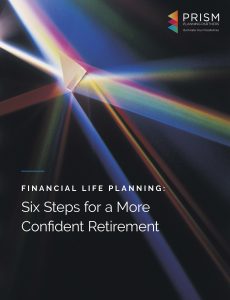Financial fraud online is, unfortunately, very common. Senior citizens are often the favored targets. In fact, some studies suggest that 20 percent of folks over 65 have been the target of financial fraud or abuse.
Retirees in Libertyville and Lake County can take these 5 steps to protect themselves against financial fraud online. Here’s how.
1. Be aware of the situation
Financial scammers and fraudsters go looking for people 65 and over. Why? Because they are more likely to have assets than younger people. Many retirees own their own homes, have retirement accounts, and live comfortably – all green pastures as far as scammers are concerned.
Are you on the right financial path? Contact Prism Planning Partners today for a consultation!
But there are additional reasons as well. Many older people are trusting of strangers. Some fraud is designed to look like a charity or a grandchild stranded and in need of some cash. These are designed to draw you in with goodwill – to take your money.
Some senior citizens may be lonely and disinclined to hang up on a friendly voice. Older people may also be more isolated and see the incursions of people trying to deceive them as social occasions.
Scammers have gotten more sophisticated, too. Common scams of the past included “official” seeming calls from the Internal Revenue Service (IRS), using local phone numbers. But it’s been widely publicized that the IRS will never call you. So, scammers have tried to gain access to sensitive information in other ways, such as pretending to be tech support, ready to save your computer from a horrible virus. Some seniors, wary of computer issues, unintentionally allow scammers to gain access to their computers or phones without realizing their error.
The answer? Be aware of the scope of the problem and be vigilant in guarding against it.
2. Monitor your financial accounts frequently
The best guarantee against successful fraud is to be aware of any unauthorized activity in your financial accounts. Senior citizens should check their bank accounts, savings accounts, retirement accounts, investment accounts, and credit card accounts frequently.
If you see an unauthorized withdrawal, purchase, or any other unusual activity, report it to the relevant financial institution as soon as possible.
It’s also a good idea to report it to the police as well as the FBI. Reporting it helps law enforcement to have a record of abuse and thus to track illegal activity more effectively. Please do not let embarrassment prevent you from reporting these crimes. Scams can happen to savvy and sophisticated people, too.
3. Manage your documents and your accounts
Senior citizens need to manage their personal information documents and financial account documents to protect themselves.
First, financial fraud online is highly sophisticated about using information that is often used to verify identity, such as Social Security numbers and driver’s license numbers. These numbers can be used to verify a bogus identity, allowing fraudsters to then drain your financial accounts. They can even set up fake accounts and transfer your assets to those accounts.
Enforce similar protections on all your financial account numbers as well. These numbers can also, of course, be used to take money out of the accounts.
Protect yourself by never giving out your social security number, driver’s license number, or account numbers to anyone or any organization you don’t know.
Don’t leave this information out where it can be seen or accessed by people in your home. Unfortunately, a large proportion of financial fraud against seniors is perpetrated by family members and people they know. Don’t assume that a family member will be above taking advantage of you. It’s better to be safe than sorry.
Don’t enter or use these numbers in unsecure online environments, such as public computers found in libraries. Use good security software on your home computer, as well. Please make sure any websites you visit are secure, especially before completing a purchase.
Finally, shred all financial statements and material that could contain numbers verifying your identity before disposing of them.
4. Don’t respond to appeals from unfamiliar sources
Many unsuspecting people can be moved by appeals for help. A charity, a person in desperate need, a good cause – all can be reasons to open your pocketbooks. Criminals intending to commit financial fraud know this. As a result, they frequently imitate people or organizations asking for help.
Research all charities and good causes thoroughly before donating to them. Look up their web sites. Note their physical addresses. Call and ask to be sent their literature through the mail. If they’re legitimate, they’ll have a physical presence and material about their activities.
Never assume an online appeal from a person is legitimate. Scammers can be very cunning. They will craft a story about someone in dire straits. That’s quite intentional. They are playing on your heartstrings, all to gain your assets.
5. Don’t respond to requests for payment
One form of financial fraud purports to come from organizations to whom you owe money. You may receive a call or e-mail from the IRS, for example, claiming that you owe back taxes. Or, you may receive communications from the Social Security Administration (SSA) claiming that they will withhold your checks until you have cleared your irregularities in your account.
Some of these can sound quite threatening, demanding immediate payment and threatening legal prosecution or garnishment of your Social Security check if you don’t comply. They are designed to frighten elderly people who might be living on fixed incomes.
These communications can seem very legitimate. However, the U.S. government will never call you up or e-mail you out of the blue and demand payment. You will receive a letter with information about your account. (If you do owe taxes, by the way, you can try to negotiate payment: you will never face a sudden demand to pay up or face repercussions.)
Although scammers frequently try to use the firepower associated with large government organizations, they don’t restrict themselves to imitating the government. Fraud can also take the guise of stores, for example, demanding immediate payment for goods they say they sent.
These scams can be effective for multiple reasons. Taxes can be confusing and people may not be fully aware of what they owe and what they have paid. The rise of online shopping allows stores to claim that they sent you goods, whether they have or not.
The key is to remain calm and demand an accounting of what you owe, in writing. That usually causes the fraudsters to vanish. Never pay them in any form, or give them financial information.
Senior citizens can benefit from comprehensive financial planning. A CERTIFIED FINANCIAL PLANNER ™️ Professional in Libertyville can help you maximize your assets and protect against risk.
At Prism Planning Partners, we are CERTIFIED FINANCIAL PLANNER ™️ Professionals committed to facilitating important questions so that we can help you explore all of your opportunities. We offer a broad array of financial planning and consulting services for our clients-including retirement, investment, and estate planning.
Contact us today and let us illuminate your possibilities!
 Download our free eBook today!
Download our free eBook today!



